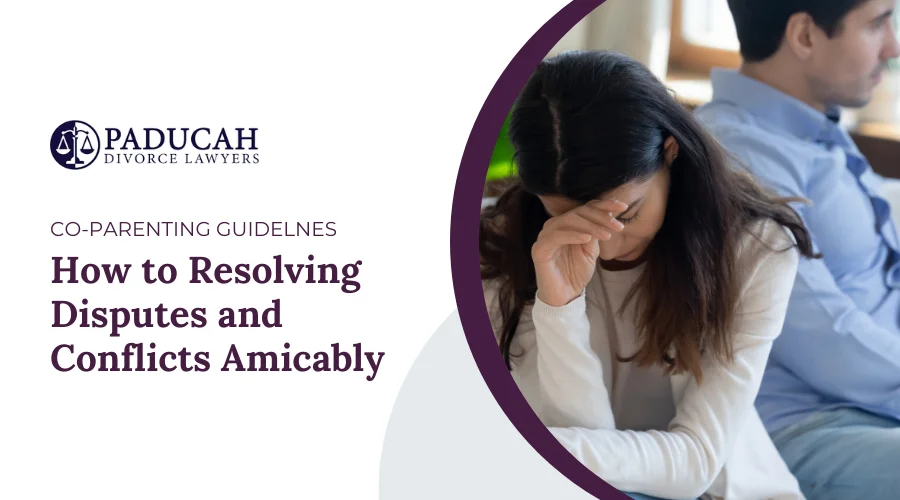In the complicated world of relationships, conflicts are common, especially when parents raise kids together. Resolving disagreements becomes important for ensuring the family environment is good for everyone. This blog talks about how co-parents can solve problems effectively. It explains how getting along well and talking openly are crucial.
Parents can build a strong family foundation by understanding each other and talking positively. The main idea is to create a loving and supportive family, focusing on caring and talking to each other well. Uncover the possibilities of our legal support through a complimentary initial consultation with the Paducah Co Parenting Support Attorney.
How Do You Resolve Disputes With Your Parents?
It’s important to understand and empathize with each other to resolve conflicts well. Keeping an open mind is crucial when you have disagreements with your parents. Actively listening is key – take the time to understand their point of view before sharing yours.
Expressing your feelings calmly and respectfully helps create a better conversation. This way of handling things calms the tension and builds a strong connection between you and your parents. It’s about understanding and supporting each other to strengthen your bond.
Learn more about A Guide to Respectful and Constructive Co-Parenting Communication
Conflict Management in Co-Parenting: Why it’s important
Co-parenting is a unique journey that requires special skills to handle conflicts between parents. It involves combining personal feelings with shared responsibilities, which requires a careful way of resolving problems.
Effective conflict resolution is like the main piece holding everything together. It’s crucial for creating a stable and loving environment for the kids when their parents have disagreements. By thoughtfully dealing with issues, co-parents protect their children’s well-being and let them grow up in a happy and supportive atmosphere, away from any negative effects that arguments between parents could have on them.
Tips for Conflict Management in Co-Parenting
Talk Openly
It’s super important to have open and honest conversations in co-parenting. Make a space where both parents can express their emotions and ideas without fear of criticism. Actively listening and understanding each other helps foster trust and find solutions to issues before they worsen.
Focus on the Kids
When resolving conflicts in co-parenting, always think about what’s best for the children. By putting their needs first, parents can work together to find solutions and avoid unnecessary arguments. This child-focused approach ensures a stable and caring environment for the kids.
Get Help if Needed
If talking directly doesn’t work well, getting a neutral third party, like a mediator or counselor, can be helpful. They know how to solve conflicts and can positively guide the discussion. Mediation provides a structured way for parents to discuss concerns, find solutions, and make agreements that benefit everyone, especially the children.
Effects of Conflict on Children
Research consistently shows that exposure to parental conflict can negatively impact children’s emotional and psychological well-being. From increased stress levels to behavioral issues, children may suffer the consequences of unresolved disputes between co-parents. This highlights the urgency of adopting effective conflict resolution mechanisms.
Effective Communication in Co-Parenting
Communication is the linchpin of successful co-parenting. Clear and respectful communication helps prevent misunderstandings and allows co-parents to collaborate effectively.
Utilize various communication tools, such as shared calendars and co-parenting apps, to keep everyone on the same page regarding the children’s schedules and activities.
Co-Parenting Strategies for Conflict Resolution
Make a Co-Parenting Plan
To avoid problems, creating a plan for co-parenting is helpful. This plan is like a roadmap clearly showing what both parents should expect and do. It covers how to raise the kids, when each parent gets time with them, and how decisions will be made.
Having a well-thought-out plan reduces the chances of having conflicts. It clarifies everything so everyone knows what to do, creating a framework for a more organized co-parenting experience.
Check-In Regularly
Another important strategy for co-parents is to have regular check-ins. These are scheduled talks about how the kids are doing, any worries, or if there are changes in plans. Talking about things regularly helps prevent small issues from turning into big problems.
These check-ins are a space for open communication, keeping both parents informed and working together to meet the changing needs of the children. It’s a way to avoid conflicts and keep a cooperative co-parenting relationship.
Establishing Boundaries and Rules in Co-Parenting:
Clear boundaries and rules provide a framework for co-parenting. Define responsibilities, agree on discipline methods, and establish consistency in parenting styles. Conflicts arising from differing approaches can be minimized when both co-parents are on the same page.
Co-parents often face disagreements, but how they handle them is crucial. Good communication, focusing on what’s best for the kids, and being proactive in solving problems help create a loving environment. Co-parenting is tough, but conflicts can be solved nicely with the right ways to work together, ensuring both parents and children are happy and doing well.






